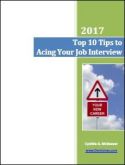 |
||
The Informational InterviewAn informational interview can be a useful tool in your job search. It's particularly effective if you're trying to switch industries or functional specialties - or, if you're just starting out in your career. The idea is to connect with people who are in a field or position that's of interest to you, and then have a face to face meeting to find out more about what they do and how they got to where they are. The take away from these meetings should confirm your interest, or perhaps, give you an inside look that causes you to go in a different direction. You will find most people to be helpful, and willing to give you 20-30 minutes of their time for this meeting. Here's a step by step tutorial on how to land an informational interview and what to do once you get there. Finding ContactsOur How to Find a Job section will give you several ideas on how to find people to talk to in your job search. Many of these tactics can be used for informational interviewing as well. The key? You need to be willing to pick up the phone to talk to people.  It's that simple...and for some of us, that hard! Keep in mind that most people will want to help. You're not selling anything. You're not asking for a job. You are merely looking for information. People like to talk about themselves. An informational interview gives them a great opportunity to do that. This session is like a mini coaching session, where they will give you nuggets of information you can use in your job search. So, how to find contacts? Talk to your friends, relatives, neighbors, acquaintenances. Tell them what you want to do. They will help connect you with people in the space that interests you. Attend networking meetings from your local Chamber of Commerce. Attend trade and professional association meetings to meet people in the field you're interested in. All of these connections will lead you to people to talk to. You can also use social networking sites, like Linked In. Find people who do what you want to do, and don't be afraid to reach out to them. At the MeetingMake sure you approach an informational interview like a job interview...even though it's not! You need to do some research into the industry and/or function you're interested in, to give you a framework for asking questions. The idea is to get the person you're meeting with talking. Have a list of questions ready. Prioritize them to make sure you cover your key questions in every meeting, but have additional questions ready in case your contact gives you more time. Some questions you might ask include:
Your contact will also want to know something about you. Make sure you bring a resume with you. For help in putting a resume together, see How to Write a Resume. Make sure you can answer questions about why the industry or function interests you. Interview Questions and Answers can give you some insight on what questions to anticipate during not only a job interview, but an informational interview as well. After the MeetingMake sure that you follow up with a thank you note. You can get some great tips on how to structure this note at our section on Interview Thank You Letters. Keep in touch with these networking contacts. Let them know how your job search is progressing, and how you've followed up with people they've referred. Build your rolodex. It will pay off in the future! |
|
|
|
[?] SUBSCRIBE
|
||
About Us | Contact Us |
Privacy Policy |
||





